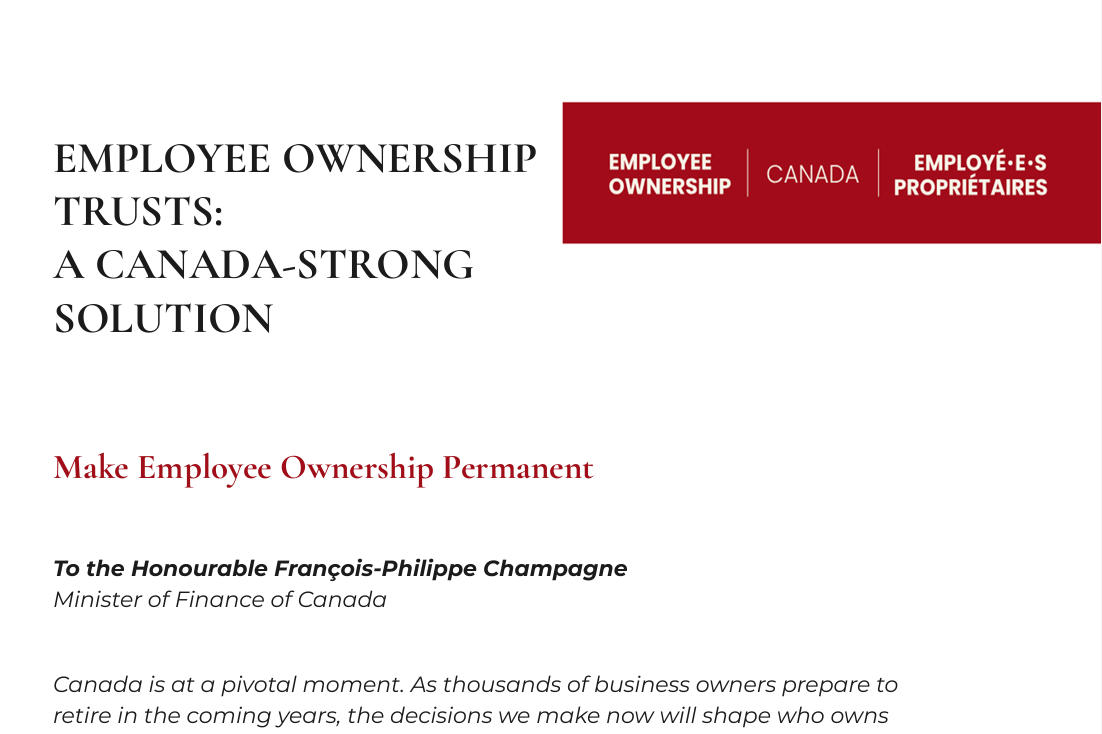Social Capital Partners has a long history of investing in people and projects that create more economic opportunity in Canada. Recently, our focus has been on establishing more avenues for working Canadians to build wealth through ownership.
We will continue this work by supporting efforts to make the new legislation around Employee Ownership Trusts effective so that it can be used to support business transition and build wealth for workers.
But we will also deepen this work. In SCP’s upcoming strategic phase, we will build on our experience advancing employee ownership by focusing on additional issues which impact the ability of working Canadians to build wealth and economic security. We will look for projects, policies and investments that will lead to more democratic control of the economy and confront the wealth concentration that is plaguing most democratic societies.
We will do this because the evidence is clear that extreme wealth inequality leads to a concentration of economic and political power, which has negative implications for social cohesion, economic resilience, community well-being, human happiness and democratic stability. We don’t think these issues are getting the attention they demand.
Wealth today is being created in very different ways than it was 20 years ago. Capitalism is changing dramatically, with wealth and value creation driven by American-based tech platforms, private equity buy-out funds, oligopolistic markets, geopolitical competition, wealth sheltering strategies, intellectual property, Artificial Intelligence, financialization, and state-led economic activity, amongst others (whew!).
And yet, in Canada, our public narratives about economic policy are trapped in the long, boring debates of the 1990s. Too many of those influencing decisions and leading discussions don’t seem to understand how our economy works anymore.
“The evidence is clear that extreme wealth inequality leads to a concentration of economic and political power, which has negative implications for social cohesion, economic resilience, community well-being, human happiness and democratic stability. We don’t think these issues are getting the attention they demand.”
Thankfully, there are many ideas around the world about how to confront this moment so that capitalism is more inclusive and works for more people, and many people in Canada with ideas about how to break down the barriers to wealth creation that many people experience. At SCP, we hope we can use our knowledge, experience, licence and insight to convene, provoke, and shape an intentional conversation about the way the economy works and who it serves.
And we will focus on practical solutions. We remain humble because, like all those who try new approaches, we have often failed on our path to innovate. But we are comfortable taking risks, trying things that others can’t and telling the truth as we see it. We might not know all the answers, but we work hard to make sure that we ask the right questions:
- How can we get more capital going to the people and places where it does the most good and produce systems-level change?
- How can we reshape public policy frameworks to change incentives and produce better outcomes for working Canadians?
- How can we scale the initiatives that we know are already working?
We genuinely believe that good choices in the coming years can create more opportunities for more people to build wealth, which will lead to a more inclusive capitalism and a more resilient democracy.
The issues we are confronting are enormous. We hope our friends, networks and communities can help us identify where we can have the most transformative, enduring impact in the coming years and join us on our journey.
Share with a friend
Related reading
From Guidelines to Action: Feedback on the Proposed Merger Enforcement Guidelines
The Competition Bureau's proposed Merger Enforcement Guidelines represent meaningful progress against trends towards corporate consolidation in Canada. In our formal feedback submission to the bureau, Social Capital Partners outlines that we strongly support the new guidelines. However, we believe that the operationalization of these guidelines will be the real test of their impact. Guidance documents shape expectations, but enforcement outcomes shape behaviour. Serial acquirers are sophisticated actors who model regulatory risk into their strategies. To succeed, the bureau must demonstrate visible capacity to track, analyze and challenge roll-up patterns that are driving up prices and sacrificing quality and service in key sectors.
A youth employment supplement could rebalance Canada’s generational divide | Policy Options
Canada is overdue for a broader debate on intergenerational fairness and how our taxes and benefits support—and exclude—different age groups. As Kiran Gill and Matthew Mendelsohn explain in Policy Options, we continue to live with programs designed by baby boomers to provide security to seniors, even if those seniors are well off. Meanwhile, young adults in our country face challenges entering the labour market, securing stable employment and saving to build some measure of economic security in the face of rising costs. They propose a policy designed to make the economy work for younger Canadians—a youth supplement to the existing Canada Workers Benefit. This youth employment supplement—aptly coined a YES!—could help rebuild financial security and allow younger adults to buy homes, finance education for themselves or their children and save for the future.
Sign the open letter | Make the Employee Ownership Trust incentive permanent
Employee Ownership Trusts (EOTs) offer a practical succession pathway that keeps businesses Canadian-owned, empowers employees to share in the value they help create and supports long-term investment in our communities. With the right policy support, employee ownership can be a strong, proven path forward for Canada’s economy. If this is something you support too, you are invited to read and sign Employee Ownership Canada’s national open letter.


